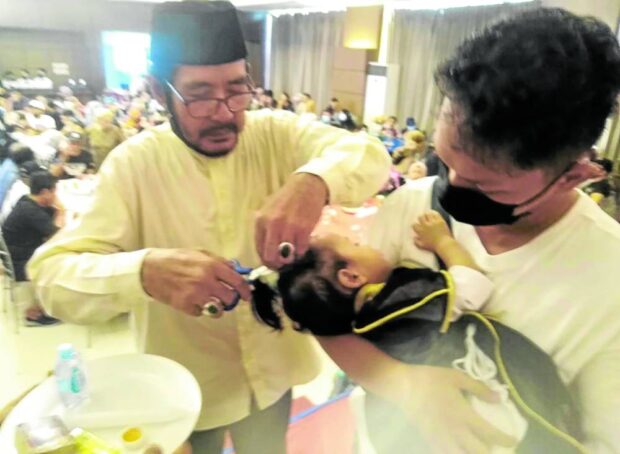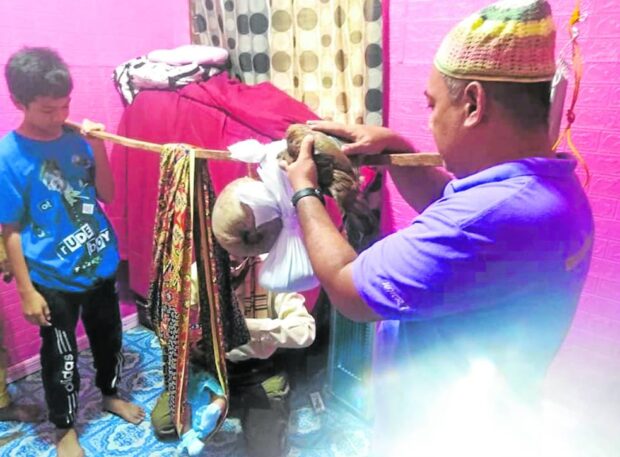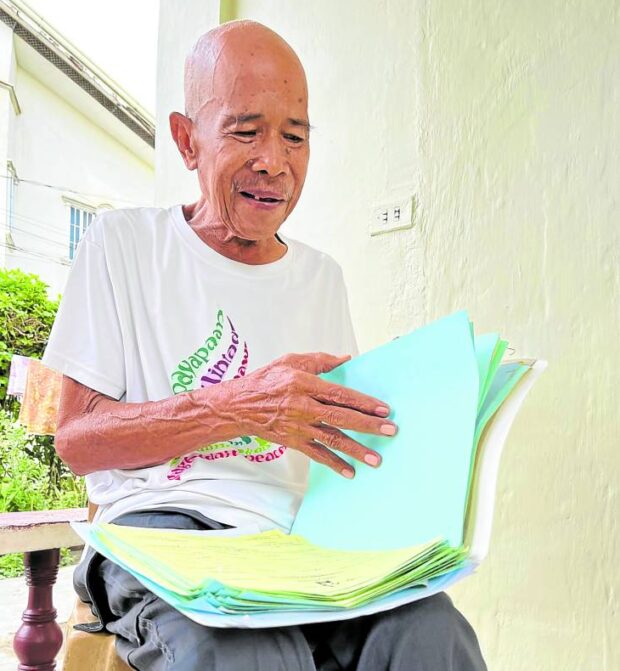Zamboanga’s ‘Schindler’ ensures Muslims enjoy a birthright

Children are given their names during this rite of passage. (Photo by JEF KIMPA / Contributor)
ZAMBOANGA CITY, Zamboanga del Sur, Philippines — Jaafar Kimpa, 70, starts the day cleaning his decades-old manual typewriter sitting on a desk along with stacks of paper neatly placed beside the trusty machine.
He would then launch into a frenzy of pounding on the keys, the click-clacks bringing him back to his younger days when typewriters were the main means to produce documents.
After running his fingers through the old keys, he then carefully pulls out the sheet of paper and closely inspects all the details.
Kimpa, a retired employee of the Bureau of Fisheries and Aquatic Resources (BFAR), would later bring every typewritten document, set in five copies, for signature by the parents of the children who just underwent “paggunting” rites.
After a child’s parents have signed the document, Kimpa then brings it to the imam, or religious leader in the village, to authenticate the information contained in it.
Article continues after this advertisementPaggunting is an Islamic rite where a child is given a name, the equivalent of baptism in the Christian tradition.
Article continues after this advertisementNoor Saada, a development worker and a minority rights advocate, explained that a basic paggunting is called “pag-aqīqah” or “aqeeqah.” The ritual is usually done seven days after a child’s birth.
For this rite of passage, a family is required to prepare a goat or a sheep, slaughtered in the halal way, to be shared with neighbors, or their immediate community.
Amid the gathering, the imam cuts a tuft of the child’s forelock along with the recitation of Islamic verses, and then wraps it with a clean cloth to be hanged in a tree near the house.
At every paggunting, Kimpa gets the key details, such as name of the baby and the parents as well as the date and place of birth, so he can prepare the document needed to facilitate the civil registration of the child.
Of the five copies of the document he prepares, Kimpa delivers one to the Office of the Civil Registrar, another goes to the National Commission on Indigenous Peoples, another to the local office of the National Commission on Muslim Filipinos, another to the family, and the remaining document for his files.
According to Kimpa, if parents or family members would like to get a certificate of live birth, they don’t need to go around for details as the paggunting had been documented, ensuring that the newborn child is no longer rendered nameless.
Among this city’s 98 villages, Kimpa works mainly in four, namely, Sangali, Rio Hondo, Mariki and Arena Blanco, all along the coast. He also serves a couple of island communities that belong to the so-called Once Islas group, which is a popular tourism draw.
It is a daily tedious but rewarding task for Kimpa who managed to register almost 10,000 undocumented individuals in this city in the last 17 years. Each document he prepares costs a family only P50.

Children are given their names during this Muslim rite of passage. (Photo by JEF KIMPA / Contributor)
Advocacy
Kimpa embarked on this advocacy in 2006 when he became part of the Interreligious Solidarity Movement for Peace. “I became exposed to different concerns of our Muslim Filipinos. There were many intelligent poor kids who could not avail of scholarships because they were unregistered, they didn’t have birth certificates to show (hence) they were denied a birthright,” he said.
Back then, Kimpa was assigned as one of the supervisors for the Philippine Fisheries Development Authority detailed in Barangay Sangali where he observed that a number of children did not have birth certificates. “Majority are from the Sama and Badjao tribes,” he noted.
Kimpa recalled that when the nongovernment group World Vision International began searching for intelligent children to be offered scholarship grants, many of those who qualified could not make it. “Their parents failed to obtain live birth records as their mothers gave birth at home and the paggunting was not documented. Once the child is ready for school, the family can’t produce birth records,” he said.
“Obtaining a birth record is another challenge; they have to earn more to pay for the documents, and queuing in government offices is daunting as many of them are not able to read and write,” Kimpa said. “Sometimes they went home without any documents. It’s disheartening to see that obtaining a piece of paper is somewhat elusive for them.”
Exposure to interreligious dialogue inspired Kimpa to form Jabu-Jabu (The Calling) Inc. and had it registered with the Securities and Exchange Commission. Jabu-jabu is Yakan for “the sounding of gongs.”
With Jabu-Jabu established, he began his project Kataranggan sin Paggunting, which is Tausug for baptismal certificate.

VITAL DOCUMENTS | Jaafar Kimpa leafs through a compilation of “paggunting” records he has made for children in Zamboanga City through the years. (Photo by JULIE S. ALIPALA / Inquirer Mindanao)
Fundamental right
Lawyer Christopher Ignacio, BFAR legal officer, describes Kimpa as the “Oskar Schindler of Zamboanga City,” likening him to the German industrialist, whose advocacy to save Jews during the Holocaust was the subject of a 1993 award-winning film.
“Kimpa committed to a remarkable work, he is an exceptional person whose noble achievement has etched an ineffaceable mark upon the plight of poor Muslim communities in Zamboanga City. Through his unyielding advocacy to the cause of civil registration, he has assumed the mantle of ‘The Zamboangueño Schindler,’ a true champion of justice and rights,” Ignacio said.
“Civil registration is a fundamental human right that we have often taken for granted, particularly [among families] in more privileged circumstances where registration is seamlessly carried out upon birth. However, in the remote regions of Mindanao, such a process is far from easy,” Ignacio noted.
“Geography and challenging circumstances, such as poverty, strife, war and displacement, have conspired to deprive many Muslims belonging to different tribes from enjoying the rights and benefits afforded to their fellow Filipinos merely because of the absence of civil registration,” Ignacio added.
He said Kimpa had “embarked on an arduous quest to register undocumented individuals languishing on the fringes of society.”
In October 2015, according to Ignacio, Kimpa distributed registration certificates to 243 Muslim children, mostly Badjaos, who were among those displaced by the 2013 Zamboanga siege.
“Through relentless determination and steady resolve, he managed to register over 4,000 Muslim children, an astonishing testament to his unyielding spirit,” Ignacio said.
He added that the accomplishments of Kimpa bear a striking resemblance to those of Schindler, Nicholas Winton and Chiune Sugihara.
Although a member of the Nazi Party led by Adolf Hitler who had embarked on an extermination of the Jews, Schindler acted to prevent his Jewish workers from being deported and face death in concentration camps during the Holocaust that killed an estimated 6 million. With the defeat of Nazi Germany in World War II, Schindler’s effort was able to save about 1,200 Jews.
The British Winton, who was of German-Jewish origin, helped to rescue over 600 children, most of them Jews, from the then Nazi-controlled Czechoslovakia just before the outbreak of World War II.
Sugihara was a junior Japanese diplomat in 1940 when he helped thousands of Jews escape persecution in Europe by issuing them transit visas from his post in Lithuania, even as the refugees failed to meet his government’s immigration criteria.
“Like them, (Kimpa) selflessly dedicated himself to protecting the rights and well-being of a marginalized group. By ensuring that undocumented Muslims are recognized and counted, he has become a lifeline for those who were previously overlooked and deprived of their rightful benefits. In a way, Mr. Kimpa saved them from the atrocities of civil nonexistence and the barbarities of statelessness,” Ignacio explained.
No one left behind
Yam Tedding, a Badjao mother and leader who works for nongovernment Community and Family Services International, said Kimpa’s painstakingly getting the personal details of undocumented individuals, especially Badjao children “is a big help to us.”
“There are other services that help our people but Kimpa tries his best to ensure that no one is left behind, especially the newly born. The documents from paggunting are similar to baptismal records of the Christians,” Tedding said.
Midzfar Omar, a Badjao from Tawi-Tawi who graduated class salutatorian from the Philippine National Police Academy in 2017, sees the need to elevate the awareness among Badjao parents to have their children registered early on.
Lawyer Alexander Eric Elias, the city civil registrar, welcomes Kimpa’s efforts in documenting paggunting by producing some sort of a baptismal certification of newborn Muslim children. “We collaborate with him, especially in the listing. So far, he helped a number of our indigenous people in the [birth] registration,” Elias said.
Despite his occasional health problems and limited resources, Kimpa vows to continue his advocacy.
“Before I sleep, I have this feeling of fulfillment — that a child, an undocumented person, finally attained identity, rights, and dignity. I don’t earn anything from this advocacy, I guess it’s a calling, a purpose given to me by the Almighty Allah,” Kimpa said.